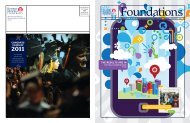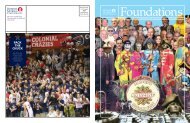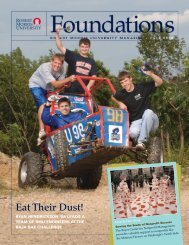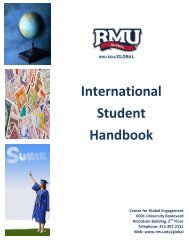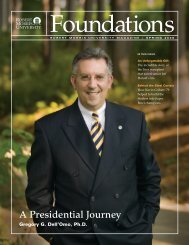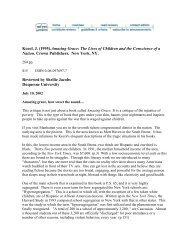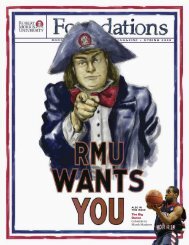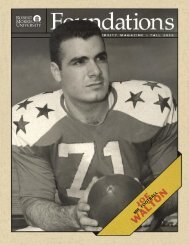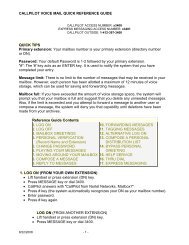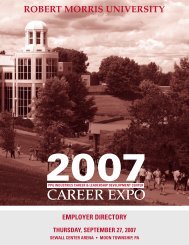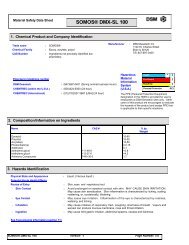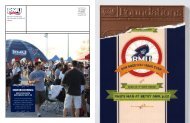Spring 2007 - Robert Morris University
Spring 2007 - Robert Morris University
Spring 2007 - Robert Morris University
- No tags were found...
You also want an ePaper? Increase the reach of your titles
YUMPU automatically turns print PDFs into web optimized ePapers that Google loves.
age groups, including the elderly, but the<br />
family track also contains a component<br />
on caring for children.<br />
The PMHNP track covers<br />
psychiatric illnesses,<br />
neuropharmocology and<br />
neurobiology. All three tracks<br />
emphasize several key skill<br />
sets. “Nurses will improve<br />
their ability to perform<br />
differential diagnoses,”<br />
Davidson says. They will learn<br />
to identify the common illnesses<br />
and how to tell when a patient<br />
might have a more serious<br />
problem. The B.S.N. to D.N.P.<br />
option can be completed either<br />
full time in three years or<br />
part time in six years.<br />
MEGAN AURANDT ‘07 + GRADUATE OF THE B.S.N. PROGRAM<br />
and found that sometimes nurses base their decisions on<br />
things like how much time they have,” Davidson says.<br />
“That’s not necessarily the best for the patient. Instead<br />
nurses should look at factors such as how sick the patient<br />
is, what is the diagnosis and what are the risks.”<br />
The next major hurdle for the D.N.P. program is earning<br />
accreditation from the Commission on Collegiate Nursing<br />
Education, a national organization that oversees nursing<br />
education in the U.S. But the CCNE hasn’t had a chance to<br />
develop accreditation standards for the D.N.P. Davidson is<br />
among a group of educators that will create a process for<br />
other universities looking to offer a D.N.P. Her participation<br />
gives RMU a voice in the future of nursing.<br />
Preparing nurse practitioners at a doctoral level is a major<br />
step for the profession, according to DiCuccio. “Doctoral<br />
education is much more intense than it was at a master’s<br />
level. RMU is educating nurses to be bedside scientists,”<br />
she says.<br />
The D.N.P. program incorporates<br />
several of RMU’s traditional<br />
strengths: strong nursing education,<br />
communications skills, business and<br />
technology. The <strong>University</strong>’s Bachelor of<br />
Science in Nursing program boasts one of the highest NCLEX<br />
exam pass rates in the state, and 100 percent of RMU’s<br />
nursing graduates have found employment.<br />
D.N.P. students will benefit from the same<br />
faculty and facilities that have spurred other<br />
graduates to success. Students will spend<br />
time studying the dynamics of teamwork,<br />
and they’ll gain clinical experience in<br />
institutions such as Children’s Hospital<br />
of Pittsburgh, Heritage Valley Health<br />
System and Magee-Womens<br />
Hospital. They’ll study health<br />
care finance and health policy<br />
to gain a better understanding<br />
of the industry, and they’ll use<br />
personal digital assistants, or PDAs,<br />
to complement their clinical practice.<br />
PROGRAM<br />
IN THE B.S.N.<br />
CONSTANCE JORDAN + STUDENT<br />
A final critical piece of the D.N.P. program<br />
is the idea of evidence-based practice.<br />
“It means not just doing things because,<br />
well, we’ve been doing them that way<br />
forever,” Davidson says. Nurses will<br />
learn to collect and analyze<br />
clinical data to spot problems<br />
and develop better procedures.<br />
“Somebody did a survey<br />
CONSTANCE JORDAN + STUDENT IN THE B.S.N. PROGRAM<br />
WRITTEN BY JOSH EARL | PHOTOGRAPHY BY KEVIN COOKE<br />
HEALTH+<br />
WATCH<br />
While RMU is expanding its offerings in the discipline of<br />
nursing, the <strong>University</strong> is also looking to fill other needs<br />
within the health care industry. This fall, RMU plans to<br />
launch a Bachelor of Science in Nuclear Medicine<br />
Technology degree program.<br />
Nuclear medicine is a type of medical imaging<br />
that uses radioactive isotopes to diagnose<br />
diseases. The patient ingests or is injected<br />
with a small amount of radioactive<br />
material, and the technologist tracks<br />
the course of the radioactivity<br />
with a gamma camera.<br />
Demand for nuclear medicine<br />
technologists is growing rapidly,<br />
and RMU will be the first in the<br />
region to offer a four-year degree<br />
in this field. The <strong>University</strong> is<br />
currently awaiting approval<br />
for the program from the<br />
Pennsylvania Department<br />
of Education.<br />
ROBERT MORRIS UNIVERSITY FOUNDATIONS • 15



